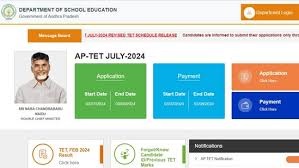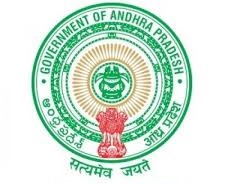APTET TET Question Paper Andhra Pradesh Teacher Eligibility Test : Department Of School Education
Organisation : Government Of Andhra Pradesh, Department Of School Education
Recruitment Name : Andhra Pradesh Teacher Eligibility Test APTET TET
Document Type : Question Paper
Year : JULY 2024
Website : https://aptet.apcfss.in/TETQpsKeysReport.do
APTET TET Andhra Pradesh Question Paper
1. Understanding of one’s own thought process is called as
1. Meta cognition
2. Intelligence
3. Creativity
4. Directed thinking

2. This law encourages giving assignments and homeworks to children
1. Law of Effect
2. Law of Readiness
3. Law of Exercise
4. Law of Reinforcement
3. The factor that influences learning, related to learner
1. Teaching methods
2. Learning resources
3. Learning environment
4. Mental Health
4. The book “Mentality of Apes” was written by
1. Francis Galton
2. W.C. Bagley
3. Kohler
4. Bruner
5. Using learned concept in a new situation is called
1. Knowledge
2. Evaluation
3. Understanding
4. Application
6. As per Vygotsky, Outer speech seen in children is useful for
1. Enjoyment
2. Communication
3. Self direction
4. Learning language
7. Play grounds, Public parks, Libraries are
1. Self resources
2. Community resources
3. Technology resources
4. School resources
8. Ability to suggest multiple solutions to a problem is
1. Convergent thinking
2. Active thinking
3. Passive thinking
4. Divergent thinking
9. Temporary storage area in a computer
1. RAM
2. ROM
3. Hard disk
4. Floppy disk
10. Thinking, creativity, Intelligence are
1. Aptitudes
2. Intellectual abilities
3. Skills
4. Physiological traits
11. Forcible forgetting is called
1. Inhibition
2. Repression
3. Amnesia
4. Feud
12. Language development comes under this development
1. Mental
2. Physical
3. Social
4. Moral
13. A stage in which emotions are displayed at a higher level than required to stimuli
1. Pre childhood
2. Neonatal Stage
3. Infancy
4. Late childhood
14. A learning curve that occurs when a student’s performance increases over a time
1. Negatively accelerated curve
2. S – Shaped curve
3. Typical learning curve
4. Positively accelerated curve
15. Dysphasia is a
1. Reading disability
2. Writing disability
3. Speech language disability
4. Arithmetic disability
16. Counselee centered counselling among the following
1. Directive counselling
2. Non – directive counselling
3. Eclectic counselling
4. Psychological counselling
17. ‘Insightful learning’ takes place through
1. Problem solving method
2. Demonstration method
3. Lecture method
4. Trial and Error method
18. Interests are
1. Innate only
2. Forms through conditioning
3. Innate and acquired
4. Acquired only
19. The factor that is useful to identify our children even in a large crowd is
1. Interest
2. Context
3. Previous experiences
4. Familiarity
20. Expand N.T.A
1. National Testing Agency
2. Non Testing Agency
3. National Tribal Academy
4. National Training Academy
21. This will not happen in group discussion.
1. Exchange of ideas
2. Development of Communication skills
3. Mechanical Learning
4. Development of self confidence
22. “High expectations of the teacher leads to the better performance of the Students” – This phenomenon is called
1. Halo effect
2. Pygmalion effect
3. Zeigarnic effect
4. Achievement effect
23. In general, the memory which we use to learn poems and tables
1. Active memory
2. Rote memory
3. Short term memory
4. Logical memory
24. Hypothetic – deductive reasoning is the characteristic feature of this stage
1. Pre – Operational stage
2. Sensory – Motor stage
3. Concrete – Operational Stage
4. Formal – Operational Stage
25. Evaluation takes place in this teaching phase
1. Post active phase
2. Pre active phase
3. Interactive phase
4. Classroom active phase
26. Teacher is conducting experiment on “The effect of ICT based learning on the achievement levels of the children” Here dependent variable is
1. Conducting experiment
2. ICT based learning
3. Achievement levels of the children
4. Students & Teacher
27. The process of keen observation and understanding in Kolb’s learning cycle
1. Active experimentation
2. Abstract conceptualization
3. Concrete experiences
4. Reflective observation
28. Auditory learners learn easily through
1. Listening
2. Speaking
3. Reading
4. Writing
29. In pre-conventional level, Moral behaviour of a person is governed by
1. Fear of punishment
2. Person’s conscience
3. Approval of others
4. Laws and morals
30. Radhika neither wants to do homework nor get punishment from her teacher. The conflict here is
1. Approach – Approach
2. Avoidance – Avoidance
3. Approach – Avoidance
4. Double approach – Avoidance
Structure Of APTET
a) The structure and content of the TET is given in the following paragraphs. All questions will be Multiple Choice Questions (MCQs), each carrying One Mark, with four alternatives out of which One Answer will be correct. There will be no Negative Marking.
b) There will be Two Papers for the TET. Paper-I will be for a person who intends to be a teacher for Classes I to V, Paper-II will be for a person who intends to be a teacher for Classes VI to VIII. Those candidates who have both D.El.Ed and B.Ed qualifications for Paper-1 and Paper-2 intends to be a Teacher either for Classes I to V or for Classes VI to VIII are only eligible to appear in both Papers (Paper I and Paper II).
c) Paper-1 A :
For Classes I to V in Regular Schools
Number of Multiple Choice Questions MCQs – 150
Duration of examination: 2 hours and 30 minutes
Structure and Content (all compulsory)
i) Child Development and Pedagogy 30 MCQs 30 Marks
ii) Language I 30 MCQs 30 Marks
iii) Language II (English) 30 MCQs 30 Marks
iv) Mathematics 30 MCQs 30 Marks
v) Environmental Studies 30 MCQs 30 Marks
Total 150 MCQs 150 Marks

Download Question Paper
APTET TET JULY 2024 Question Paper – https://www.pdfquestion.in/uploads/pdf2024/43022-q.pdf